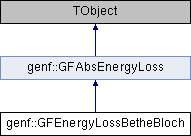 |
LArSoft
v07_13_02
Liquid Argon Software toolkit - http://larsoft.org/
|
 |
LArSoft
v07_13_02
Liquid Argon Software toolkit - http://larsoft.org/
|
#include "GFEnergyLossBetheBloch.h"

Public Member Functions | |
| double | energyLoss (const double &step, const double &mom, const int &pdg, const double &matDensity, const double &matZ, const double &matA, const double &radiationLength, const double &meanExcitationEnergy, const bool &doNoise=false, TMatrixT< Double_t > *noise=NULL, const TMatrixT< Double_t > *jacobian=NULL, const TVector3 *directionBefore=NULL, const TVector3 *directionAfter=NULL) |
| Returns energy loss, optional calculation of energy loss straggeling. More... | |
| virtual | ~GFEnergyLossBetheBloch () |
Protected Member Functions | |
| void | getParticleParameters (const int &pdg, double &charge, double &mass) |
| Gets particle charge and mass (in GeV) More... | |
| double | getParticleMass (const int &pdg) |
| Returns particle mass (in GeV) More... | |
Definition at line 45 of file GFEnergyLossBetheBloch.h.
|
virtual |
Definition at line 24 of file GFEnergyLossBetheBloch.cxx.
|
virtual |
Returns energy loss, optional calculation of energy loss straggeling.
Uses Bethe Bloch formula to calculate energy loss. For the energy loss straggeling, different formulas are used for different regions:
Implements genf::GFAbsEnergyLoss.
Definition at line 27 of file GFEnergyLossBetheBloch.cxx.
References beta, E, larg4::f1, larg4::f2, genf::GFAbsEnergyLoss::getParticleMass(), genf::GFAbsEnergyLoss::getParticleParameters(), and GFException::setFatal().
|
protectedinherited |
Returns particle mass (in GeV)
Definition at line 35 of file GFAbsEnergyLoss.cxx.
References part.
Referenced by genf::GFEnergyLossBrems::energyLoss(), and energyLoss().
|
protectedinherited |
Gets particle charge and mass (in GeV)
Definition at line 27 of file GFAbsEnergyLoss.cxx.
References part.
Referenced by genf::GFEnergyLossBrems::energyLoss(), energyLoss(), and genf::GFEnergyLossCoulomb::energyLoss().